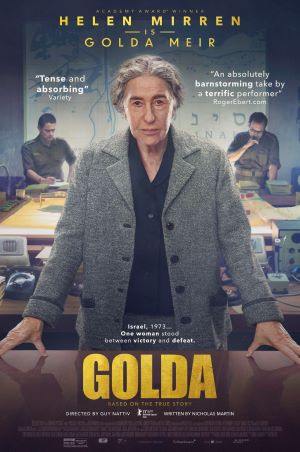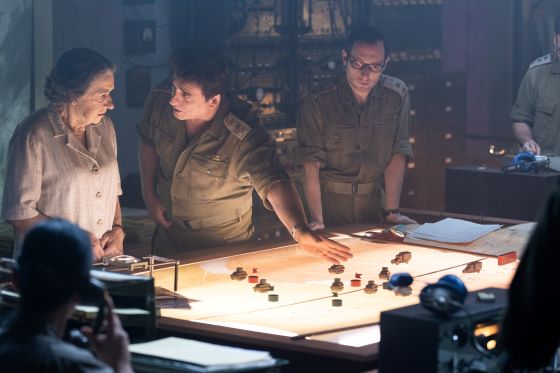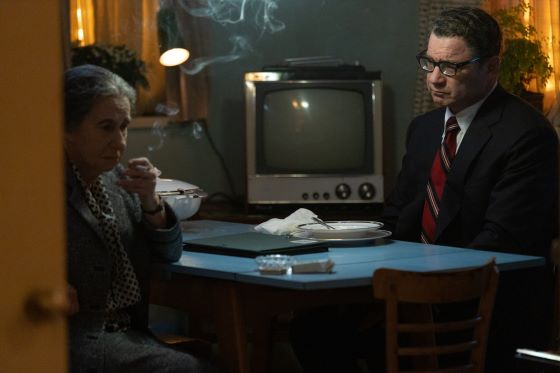

[Rating: Solid Rock Fist Up]
In Theaters Friday, August 25
Shakespeare wrote, “uneasy lies the head that wears the crown,” yet if he’d been around Israeli Prime Minister Golda Meir (Helen Mirren), he might have spared a few words for the lungs. Golda dramatizes Meir’s actions and struggles during 1973’s Yom Kippur War, yet as the literal chain-smoking signals, it was an ugly, destructive, and unglamorous period that witnessed the salvation of a country at the expense of many lives (on all sides of the battle lines).
The film unfolds as a flashback of sorts as Meir recounts the events surrounding the War to the Agranat Commission, which is tasked with investigating the failings of the military and government before, during, and after the conflict. It depicts Meir just prior to the outbreak of hostilities as she evaluates the intel suggesting an imminent invasion by Egypt and Syria, and the push/pull of the hawks and doves in her cabinet arguing for/against mobilization and even a preemptive strike. Once the War begins, the choices become no less difficult as Meir weighs long-term consequences against short-term gains and diplomatic implications vis a vis proxy support from the U.S. and the U.S.S.R.
Flanked on all sides by Air Force, Army, and Intelligence officers that are slow to stand for her when entering a room, and slower still to respect her judgment on battlefield strategy, Meir struggles with the inevitable and familiar problem of balancing the good of the nation versus the individual. She’s haunted by the radio communications broadcasting the death of her soldiers and keeps a personal tally of all casualties that are reported, yet as the leader of a nation in its infancy, Meir knows there’s little margin for error, let alone sentimentality. Although she receives support from her loyal personal secretary, Lou Kaddar (Camille Cottin), and U.S. Secretary of State Henry Kissinger (Liev Schreiber), her seat is a lonely (and smokey) one.

The film might bear the title of Golda, yet it isn’t exclusively her story. Owing more to Lincoln than Iron Lady, Golda uses the eponymous politician as the anvil upon which a more narrow story is hammered into shape. Director Guy Nattiv and the script by Nicholas Martin eschew the biographical method and instead keep their focus on a singular event as the defining text for a broader life and career. Nattiv is betting on the fact that the Yom Kippur War and Meir’s role throughout are enough to carry that narrative and thematic load, and it is ultimately a good gamble.
Mirren, no stranger to playing heads of state, takes to the performance like a butcher to beef; make-up and wardrobe ably assist posture and gesture work that allows the performance to stand all on its own, well outside of imitation. The script gives Mirren a few opportunities to monologue, mostly at the Agranat hearing, yet it wisely clears out and allows for its lead to carry scenes with little more than a pained look or clipped command. Although there was some pre-production concern about Mirren, who is not Jewish, playing the noted politician, the move by native-Israeli Nattiv to get the best actress possible to tell his country’s story seems a wise one.
Those unfamiliar with the history of Israel, Meir, and figures like Moshe Dayan (Rami Heuberger) might not pick up on all of the historical nuances laid out in Golda, especially when it gets into the weeds of the conflict (i.e. the listening posts), yet it isn’t enough to derail the narrative. The supporting cast are there to do just that, and all provide Mirren with a great springboard to draw out different aspects of the PM’s personality. Cottin does especially good work as Meir’s one true confidant and ally, and serves as the fuel for the movie’s most revealing moments.

Meir’s navigation of the events while undergoing cancer treatments underscore the physical hurdles she had to clear along with the more subtle social ones, and the recurrence of the topic balances the broader events well. Throughout it all, Mirren maintains a steady, crooked, pained, yet resolute posture that is likewise a wonderful tribute to Meir in both body and spirit. Indeed, Nattiv weaves archival footage of the real Meir in at spots, and it can be difficult to tell where the actual woman stops and the actress starts.
At a brisk 100 minutes, Golda accomplishes quite a bit in what could have easily been an unwieldy and bloated three-hour-plus hagiography. The film maneuvers through the personal, professional, spiritual, and historical in a relatively confined space to draw out the essence of a complicated and consequential world leader. Mirren shines in the title role with a performance that could have slipped into cartoonish parody, never allowing her make-up and prosthesis to overtake her careful, measured work. Like the leader herself, the film isn’t flashy or even entirely pleasant, but it gets the job done and then some.





Comments on this entry are closed.